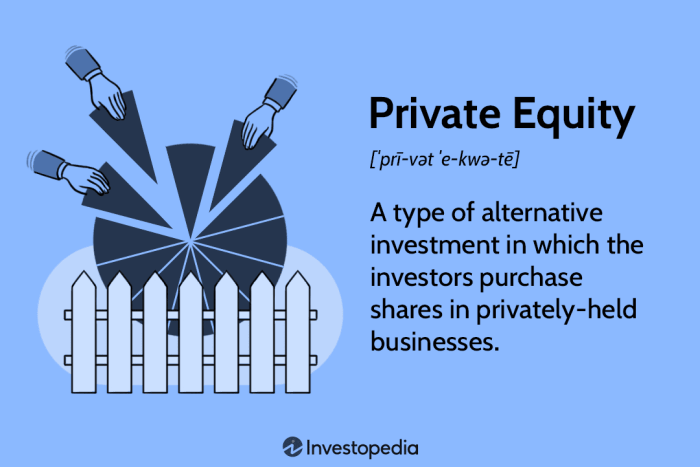Private equity investing sets the stage for this enthralling narrative, offering readers a glimpse into a story that is rich in detail and brimming with originality. From venture capital to leveraged buyouts, this topic is a game-changer in the financial world.
Introduction to Private Equity Investing

Private equity investing involves investing in privately-held companies with the aim of acquiring equity ownership. This form of investing plays a crucial role in the financial market by providing capital to companies that are not publicly traded.
Unlike stocks or bonds, private equity investments are not traded on a public exchange. Instead, they involve buying shares of a private company directly or through a private equity fund. This type of investing typically involves a longer investment horizon and a higher level of risk compared to traditional investments.
The primary objectives of private equity investing include achieving high returns for investors by actively managing and growing the companies in which they invest. Private equity investors often work closely with the management teams of their portfolio companies to enhance their performance and ultimately increase their value.
Types of Private Equity Investments
Private equity investments come in various forms, each with its own characteristics, risk profiles, and potential returns.
Venture Capital
Venture capital involves investing in early-stage companies with high growth potential. These investments are typically made in exchange for equity and involve a higher level of risk due to the uncertain nature of startups. However, successful venture capital investments can yield substantial returns. Examples include investments in companies like Uber and Airbnb.
Growth Capital
Growth capital investments are made in established companies looking to expand or restructure. These investments are less risky than venture capital but still offer the potential for significant returns. Growth capital investments often involve minority stakes in companies and can help fuel expansion or acquisitions.
Leveraged Buyouts
Leveraged buyouts involve acquiring a company using a significant amount of debt. Private equity firms use the target company’s assets as collateral for the debt, with the goal of improving the company’s performance and eventually selling it for a profit. Leveraged buyouts can be risky due to the high debt levels involved but can also offer substantial returns if successful. An example of a leveraged buyout is the acquisition of Dell by Silver Lake Partners.
Distressed Investments
Distressed investments involve investing in companies facing financial distress, such as bankruptcy or restructuring. These investments are high risk but can offer the potential for significant returns if the company is able to turn around its operations. Distressed investments often involve buying debt or equity at a discounted price with the hope of profiting from the company’s recovery. One famous distressed investment example is the acquisition of Chrysler by Cerberus Capital Management during the financial crisis.
Key Players in Private Equity Investing
Private equity investing involves various key players who play crucial roles in the investment process and the success of the overall venture. These key players include private equity firms, investors, fund managers, and portfolio companies.
Private Equity Firms
Private equity firms are entities that raise capital from investors to create private equity funds. These firms are responsible for identifying investment opportunities, conducting due diligence, negotiating deals, and managing investments on behalf of their investors. Private equity firms play a central role in the entire private equity investment process.
Investors
Investors are individuals or institutions that provide capital to private equity firms. These investors include pension funds, endowments, high-net-worth individuals, and other institutional investors. Investors entrust their capital to private equity firms with the expectation of generating attractive returns over the long term.
Fund Managers
Fund managers are professionals employed by private equity firms to manage the day-to-day operations of private equity funds. Fund managers are responsible for sourcing investment opportunities, conducting financial analysis, structuring deals, and overseeing the performance of portfolio companies. Fund managers play a critical role in executing the investment strategy and maximizing returns for investors.
Portfolio Companies
Portfolio companies are the businesses in which private equity firms invest. These companies may range from startups to established businesses seeking growth capital or operational improvements. Private equity firms work closely with portfolio companies to implement strategic initiatives, enhance operational efficiency, and drive value creation. The success of private equity investments heavily relies on the performance and growth of portfolio companies.
Relationships between key players in private equity investing are essential for the success of investments. Effective communication, collaboration, and alignment of interests among private equity firms, investors, fund managers, and portfolio companies are crucial for achieving investment objectives and maximizing returns. Each key player brings unique expertise and resources to the table, contributing to the overall success of private equity investments.
Process of Private Equity Investing
Private equity investing involves a series of steps from deal sourcing to exit strategy, each crucial for the success of the investment. Let’s dive into the process in more detail.
Deal Sourcing
Deal sourcing is the first step in the private equity investment process, where potential investment opportunities are identified. This can involve networking, attending industry events, working with investment bankers, or using proprietary databases to find suitable deals.
Due Diligence
Due diligence is a critical part of private equity investing, where thorough research is conducted on the target company. This involves assessing the company’s financials, operations, management team, market position, and potential risks. Due diligence helps investors make informed decisions and mitigate risks.
Valuation and Structuring Deals
Valuation is the process of determining the worth of a target company, which is crucial for negotiating the deal. Different methods like discounted cash flow (DCF), comparable company analysis, or precedent transactions are used for valuation. Once the valuation is done, deals are structured to define the terms of the investment, including ownership stake, management control, and exit options.